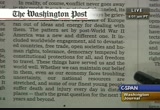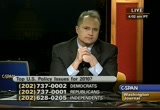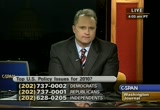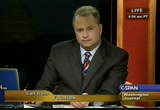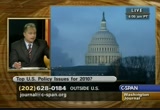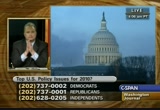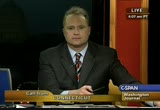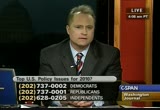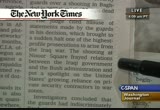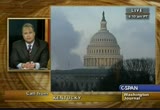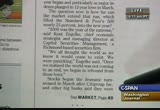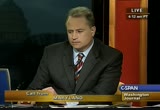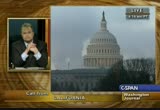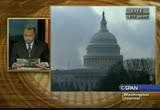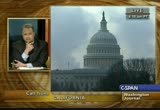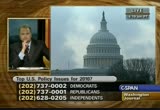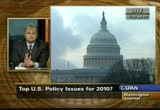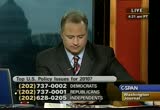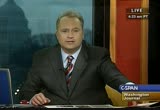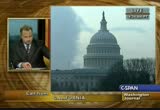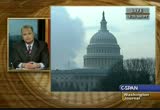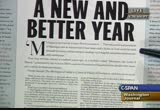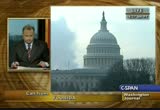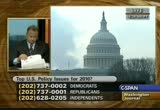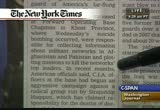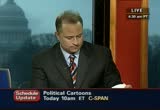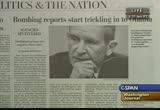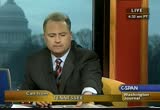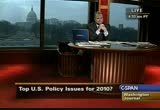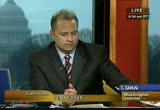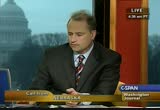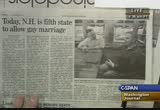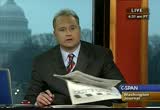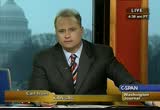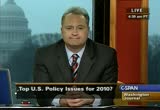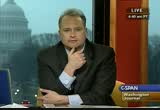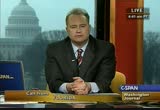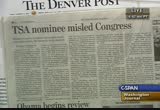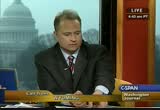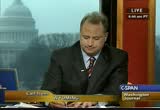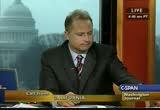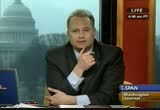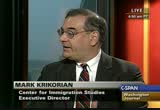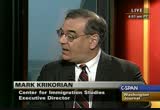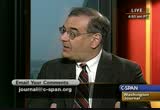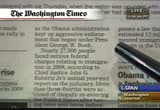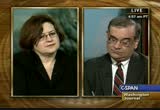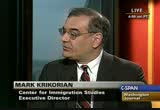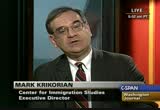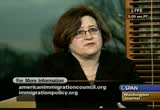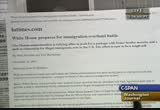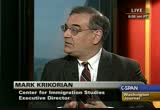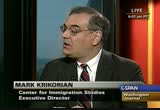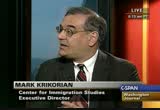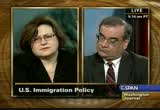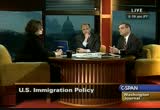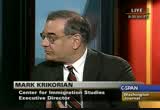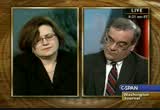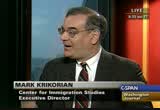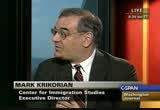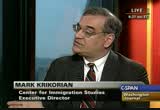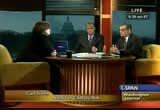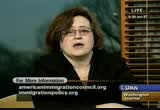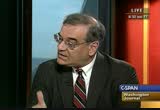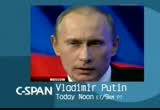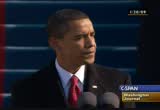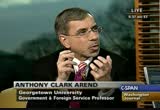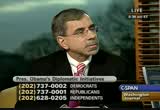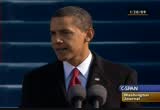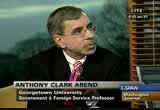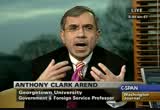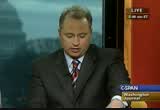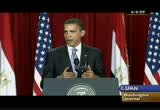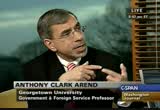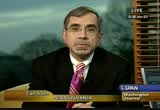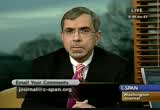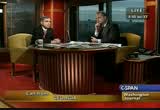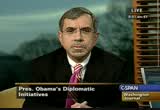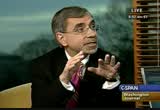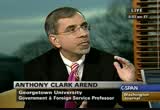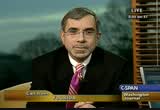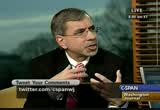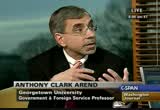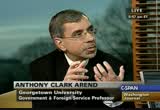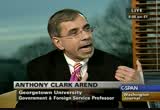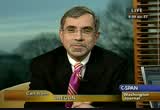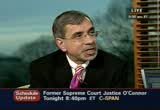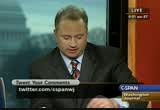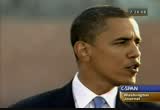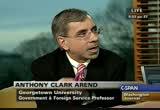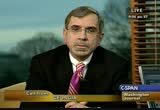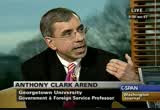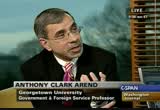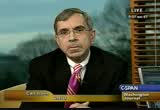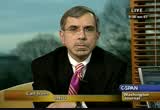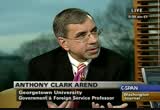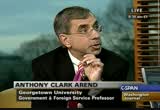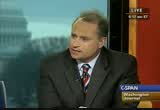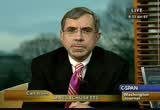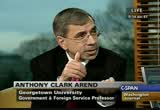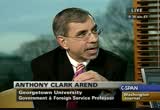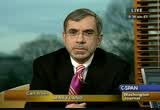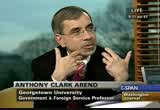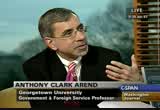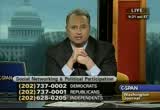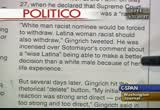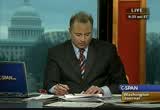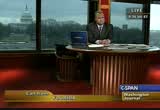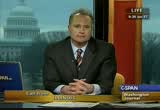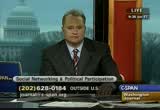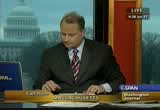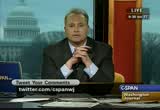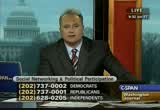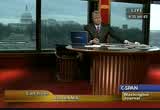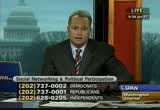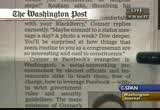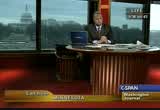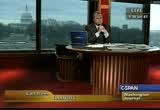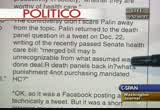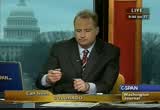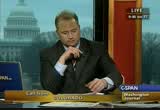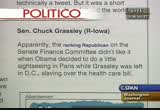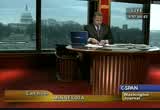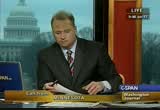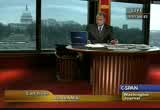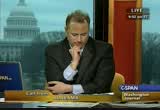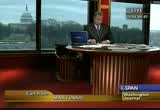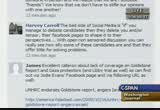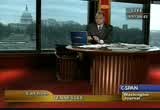tv Washington Journal CSPAN January 1, 2010 7:00am-10:00am EST
7:01 am
and then he says, unfortunately, he has several cannons pointed at him. one says the economy, once this terror, one says afghanistan and one of them says, jobs. the washington post is warning not so much about issues but ideals. the editorial for the new year -- we begin to lose faith in the great american ideals. there will always be grievances and hatreds. europe run out of ways to deal with this. they had worldwide engagement, free trade, open societies and human rights, democracy tempered by constitutional protection for everyone.
7:02 am
these things disturb us and the world. the economy is facing troubling uncertainty and the national resources are stretched. some of the finest young people are facing death and injury. that is the question for the next 10 years and beyond. harlem, democratic line. what is your name? >> happy new year. i just want to say, thank you for c-span. this is a great program. i just want to talk about immigration. i think this is a major policy that will need to be discussed in this country. >> what would you like to see happen on the immigration front? >> i would like to see a moratorium of people spending their money, and i would like to
7:03 am
say that we have a mayor in the city, who is showcased around the country and the world. we do not like to have a mayor for the simple fact that all the jobs, the poor white americans and the poor black americans, and all the others, they are left out. we are being imported with slave labor. these people did not care about us. i am not against the immigrants. but i am and happy with the notion that you come to america for a better life. you have to get this notion of america. americans are suffering. i voted for barack obama. but this not -- this does not
7:04 am
mean i will vote for the next republican. i will vote for the next republican against him if he does not address this issue. this is not an attack against immigrants. this is not an attack to keep them out of this country. but why are they coming here? host: you may want to stay around. we will talk about immigration 40 minutes from now. we are going to look at where the policy is standing, and what the congress is doing in the next year or so. we will talk with a representative of the american immigration council. this is at 7:45 eastern. we will take the phone calls on immigration. we have an independent on the line from florida. caller: thank you for taking my call and happy new year.
7:05 am
i feel like the gentleman. i want to see manufacturing brought back to the country. i want to see more people taking an interest in the economy. host: what you think about this issue? what are your thoughts? caller: we have to give incentives to the companies and corporations who are wanting to stay here, and we cannot export the labor overseas. i do not know the answer to this, but i think that it is worth thinking about, and having discussions about.
7:06 am
host: this is something that we will continue to talk about. we are talking about the top policy issues. caller: the biggest issue that is the unspoken about as the role that the government should actually play in the things that are out of its balance. i think that the major policy issues go across party lines. we have this with both major parties in politics right now. there is a -- there are a lot of people in washington who not have the effective results. the policy issue would be the extend of the policies -- the extent of the policies. they have the unintended consequences.
7:07 am
i am not talking about a conspiracy, but there are always unintended consequences. host: we do expect the president to be back in town next week and congress will come back in the coming weeks in january, with a slow start for the house and senate. we will see a lot of action, fairly quickly as the new year is underway. we have an address on twitter. cspanwj. hefre is a tweet on the issue. congress should finish health care. and the rnc are against this any way. caller: i would like for this to be personal responsibility.
7:08 am
if you review all of the government programs. we have the liberal policies for the handouts to the freeloaders, that they're eating a rebut those of us to manage to survive, even through difficult times. i managed to find two part-time jobs, to replace my income. there are always jobs out there, if you have the inspiration and the inclination, and the desire to work long enough. >> take this a bit further. translate this to the responsibility for the legislative issues, with health care and the economy. what does this mean? caller: those who are here
7:09 am
illegally, they take it upon themselves to get a good education and learn to speak english, and the american government and the constitution, and apply for citizenship and began to pay their fair share of taxes just like the rest of us, instead of getting handouts. host: there are a lot of callers today, especially for a holiday. charges have been avoided for the contractors. we are talking about 5 blackwater workers, with a significant blow to the justice department. a judge threw out the indictment of five former security guards over the shooting in baghdad, that left 17 iraqis dead and about 20 wounded.
7:10 am
this is one of the many articles on this story. is this a top policy issue for 2010? she is on the line for democrats. caller: how are you doing. host: tell us about the top issues. caller: i agree about outsourcing the jobs overseas. we have the credit cards -- and many times there is a language barrier, for these issues. in the united states we have the high-paying jobs here in the united states. host: how can this be done?
7:11 am
caller: i am not certain about how you can do this. it seems that corporate america would rather pay the lower costs, then keeping the labor here in the united states. the government may be able to find a way to keep these jobs here in the united states. host: thank you very much. the "richmond times dispatch." they have a report on the comeback of the stock market, and how the seemed unimaginable.
7:12 am
that is one take on the economy. baltimore, you are up right now. how are you doing? caller: i would say the number one policy issue for me is afghanistan. and there is the economy and jobs. i have done quite a bit of reading. this is reminding me of vietnam. i think that this is taking so many resources from the country and it will be hard to address any other problem. we are approaching this in the middle east, and this is not helping to solve the problems over there. more money should be devoted to
7:13 am
domestic problems. i would like to see a lot done with public transportation. i would like to see public transportation in baltimore. host: with afghanistan, there are lot of updates on this part of the world, including this one on january 1. a suicide bomber is invited by yemen. he killed seven cia officers -- he was indicted as an informant. this is the first time that he was brought inside the compound, and the attacker blew himself up as he was about to be searched.
7:14 am
back to the top issues of 2010, we have a woman on the republican line from cathedral city. caller: thank you very much. i am very happy. i want to tell you something. the war that we are in right now is absolutely unnecessary. there is no winner. there are only losers. i have lived through world war ii. i was in a concentration camp. i had skeletons [unintelligible] i am telling you, nobody is
7:15 am
winning in a war. they need to get out of there. they will never do anything in that country. they have an entirely different way of life. we cannot give them the changes that will make them live like americans. host: iraq is also in the headlines. it is official that the united states is alone in iraq. the british left in july about the same times that the romanians left camp dracula. nobody seems to remember --
7:16 am
host: according to this viewer, less government and spending are important. oklahoma city. you are on the line, as an independent. caller: i am calling on the outsourcing of jobs and the outsourcing of money. they are paying little or no taxes. it does not show that this is beneficial to the american public. they have cheaper labor overseas. they are not reinvesting in the united states.
7:17 am
the companies are getting -- host: thank you. thomas is on the line for republicans. the top policy issue? caller: the gentleman from connecticut is absolutely correct. the problem for this country is that we have too many freedoms. this is a radical statement. we have uncontrolled propagation, and we have the right not to do anything if we choose not to do any thing. we have the freedom to move and by weapons, and destroy lots of people. i can for seed, with my grandchildren's lifetime, a mass
7:18 am
restriction of freedom. newt gingrich said that we have to start restricting people. i see that this is coming. i am 68 years old. my generation had a lot of freedom. we were enjoying those freedoms. somewhere along those lines, there will have to be more restrictions and when this does, the constitution will just be another piece of paper. thank you for c-span. have a great new year. host: stockton, california. what are the issues for 2010? caller: good morning, and thank you for the show. i do not mean to be facetious. i like to -- i would like to
7:19 am
have c-span be less right-wing over the next year. beyond that, i would like to see -- this is just based on the tweets that you will read. and the editorial pages that they come from. so often this comes from the "wall street journal." or the new york post or the "washington examiner." these are right-wing editorial- page sources. and another change i would like to see in america is i would love to see president obama, who was about 50-50 so far. i would like to see him work on the economy and end the tax breaks for the corporations that are shipping the jobs out of fear.
7:20 am
this may help bring jobs back to the country. host: from stockton, california. susan is on the independent line. please turn down the sound. are you there? caller: good morning. i want to wish everyone a happy new year. i want to support obama but i am disappointed in the health care. i really think that we were misled, and he was using that when he was running to get people to vote for him. and now he has turned around and i am disappointed. i hope that the country will turn around and i would like to see manufacturing coming back to the country as well. this is a big problem but i really believe that when everyone during the ronald reagan administration was voting for nafta, it was the downfall
7:21 am
of the country. and i think that this need to be taken down. i remember when everyone, republicans and democrats voted for nafta. they were positive about this. i do remember them saying that if this did not work, that they would be able to reverse this. i think all of that old footage should be coming back on television, and we should be able to see the people that actually said that this was going to be good for the country. host: thank you. you said a lot. you said you were disappointed in health care. what do you want to see happen? caller: this should be single- payer. what is upsetting to me is that the people with their television shows and their talk-show personalities, when they get on
7:22 am
these programs, i have a relative in europe with greece and germany. the single-payer health care. this is a good system. and it is just unbelievable that you can, if you get sick, you can actually be bankrupt from an illness. this is so wrong that the country does not take care of its own people. we have so much money for the wars that are going on, but we do not have money for health care. host: thank you. a couple of other health care stories that may interest you. republican officials are demanding changes in the health bill. attorney general's are threatening legal action over a
7:23 am
7:24 am
host: the first and want to talk about, actually, was immigration. people have been complaining about the immigrants. you do not hear anyone complaining about the employers. people would not come if they did not get hired. they exploit them, and use the non-documented workers. they have chemicals and asbestos. that is what they use them for. that is the problem here, not the poor people who come here to make a living. the other thing that we need to look at this -- look at is the middle east. we have to see the level view of
7:25 am
the nation. we cannot criticize the nation on c-span. we have to take a look at this. i see people going on and on about muslims. but if you talk about the religion of these people, they will cut you off. we really need more information about where we stand in the united states on the middle east. this seems to be what some of the problems are, and a third, light criticism of you from a couple of weeks ago, you had someone and he was telling a caller that they were not a republican and they were calling in on the wrong line. i do not think that you should tolerate any guests talking to the callers like that. i do not support him but there -- that is no way to talk to a
7:26 am
caller. people do not know who are republicans or democrats. i am democrat who does not support what the democrats are doing. host: immigration is coming up. we are talking about diplomatic outreach. the top issues from this. is to implement the presidential speech in cairo, to mobilize the moderates to fight terrorism. we have the headline in "the chicago sun-times." newly laid-off workers filing benefits dropped last year. we have the detroit press, and they are wishing you a new and better year. michigan is an empire. the resources in michigan are so
7:27 am
different that a fence or wall to be built around the city and people could live for centuries without assistance. this was written 100 years ago -- naples, florida. you are on the republican line. what is the top issue of the year. caller: i think american imperialism is a menace to the united states and the world. president eisenhower warned us against this. host: tell us more about this.
7:28 am
caller: we have a hundred military bases in foreign countries. host: go ahead and finish up. caller: here is a thought. peace is more economically beneficial than more. war is costly and -- in lives and money and other ways. if we can make peace with the terrorists, with al qaeda, and try to make peace, with one simple gesture, this would go a long way. if we can prevail upon israel to make jerusalem a free city, the christians, the jews, and the muslims, they will all have a
7:29 am
stake there. that would be a conciliatory gesture to the terrorists. and it would not cost a lot of money except in israel with the right-wing politics. host: the caller is touching on foreign policy. and the war. the new york times goes a little bit deeper into the story. they are talking about the expanded role with the cia operatives, in the remote bases in afghanistan. they say this is an example of the transformation in recent years into a paramilitary organization --
7:30 am
we go to michigan for the next phone call. u.s. policy, the top issues. the next caller is kelly on the democrat line. caller: happy new year. host: what would you like to see washington get done? caller: i would like to see some kind of jobs program. this was pretty much a dream. the town that i live in, so many manufacturers have this done overseas. so many people in this town are not working.
7:31 am
that is on the minds of many people. a man from indianapolis -- he is not working. this is very difficult. this is the one thing that they need to concentrate on. and i agree with the previous caller. the person who said that war is very expensive. they have the things that had nothing to do with 9/11, and as we have created the kind of feeling that we are just, we are attacking people when we want to, i think that this has caused the terrorists to be angry with us and we had to know that this was coming. we would just have to expect this. host: there is a headline about bombing reports that are trickling in.
7:32 am
they said that the agencies are splintered, and the top intelligence officers said on thursday that they will command the people who did their jobs well and hold accountable the people who did not. obama began assessing these failures -- hartford, tennessee. you are up right now. john on the independent line. caller: happy new year.
7:33 am
host: some people were calling about keeping their jobs in manufacturing over here. i know that they have the money to build a plant, and we will stop giving them all the money. they are going to try to sell this back to us. they will try to sell this back to us. we have to do something. i was a democrat for 25 years. i was watching c-span and became a republican, and now i am independent. both of them want to run the world. they do not want to represent the united states. they want to represent the world. until we get an independent party, we need to have a third party. if we do not, we are in trouble.
7:34 am
ross perot told us the truth. the sucking sound, this is what happened. host: nashville, tennessee. republican color. what is your top issue? caller: this would be immigration and the problem of using up all of the taxpayer money. this has all been proven wrong. illegal immigrants is just, they do great work here, and there are a legal immigrants everywhere. one woman has been in the united states and is related to the late father. she is still an illegal alien, and this should be an issue.
7:35 am
and health care is also going bad. host: more of the front pages. the "hartford current." they are talking about retail, rebounding. they say that this was a good season in the hartford area. and the "miami herald." they are talking about cuba, they are facing economic trouble and crime, as this movement was confusing them in 2009. omaha, nebraska. on the democratic line. caller: terrorism is an important part of what we are facing. we have forgotten the people that make up the military in this country. i was watching on bloomberg, that china has increased their
7:36 am
manufacturing and that is considered part of the stabilization of the it -- of the economy. that is what the american economy has lost. we do not build anything. we manufacture everything. host: we're asking the viewers about this. we are wanting the viewer opinion, about how to make congress work for americans. in the "philadelphia inquirer." this is the fifth state to allow gay marriage. new hampshire. they will be legally married in
7:37 am
a low-key wedding. how excited are you supposed to be? the new hampshire law will have six states with gay marriage. this is in "the philadelphia inquirer." the new jersey gay marriage both was a waiting game, with only days remaining. this is all but dead right now. they were prepared to take this directly to the vote, bypassing the committee vote, they would pass the bill first. the idea was to give the assembly a chance to hear the view of the public. kansas, what is your topic issue?
7:38 am
this is an independent. caller: obviously, of like to see anything good. anything good with health care. this is not anything to put a finger on. this is the overall attitude. in a country where we have the easy example, yesterday. a judge dismissed the open-and- shut case, where the blackwater members killed 17 citizens and injured children, and this case was thrown out. we cannot even get any exemption
7:39 am
for insurance companies. this is in the health-care bill. we have the slaughter of the innocent citizens by the american company. we just need one thing that is good. pass the health care bill. any thing. host: this is the blackwater story that we spoke about earlier. they dismissed the criminal charges against the black water security guards accused of killing 17 civilians, straining the iraq-american relations, and bringing into question the contractors. what do you think the top u.s. policy issue will be in the new year? colo., republican.
7:40 am
caller: i am a democrat. host: go ahead. caller: we need to invest in nuclear energy, and fusion nuclear energy. and the investment for the better for of energy. it will not matter if they do not have the carbon tax. the coal train will stop running. and it will be better when we stop depending on carbon energy. the carbon energy for the fossil fuel energy. we will be able to depend on a better form of nuclear energy. host: we go to florida, bill, on the line for the democrats.
7:41 am
caller: the drug supply that we have, this made the switch my insurance policy a couple of times. when i got my new insurance policy, i had to take generic drugs unless the doctor would fill out a form for each medication that i needed. i have medicine that costs $460 per month. and if i take the generic drugs, i still have the seizures. i am taking the generic drugs. i go to the hospital after having a major seizure, and i know the generic drugs did not have anything in them. i can get this for $1 as a generic.
7:42 am
i could sell my prescription for $452 per month. and the prescription is just as good. my doctor will have to write the forms, and they will have to send me the form for the doctor to send back to them. they have to do this for every prescription that i need to have filled. the generics do not work for me. they just do not work and i really wish that somebody could test these drugs and see what is in them. they just do not have anything inside them. there is no pain relief, and they say that this is only $1. look at the money that they are saving. host: thank you for sharing this with us. another issue that we are dealing with is coming in the weeks ahead.
7:43 am
7:44 am
the power of attorney. taking over someone's wishes. i am just wondering what your view and what the policy ideas will be coming forward, on that issue. host: what do you think should happen? caller: if you look at the statistics, you are talking about 30% of this prior to the last three days of the care of your life. this is about 65% of everything that goes into the future. this is in the future of what people are going to pay for. and most people who choose this path are on medicare. the taxpayers are going to assume responsibility. my issue is, a person can have an active plan for their life.
7:45 am
they do not have to be on life support. they will have to come in and -- you have the transfer of power. how do we justify a position -- a physician to say that we have to proceed, with not only the person's wishes, and we have to have the best practices for the multiple [unintelligible] they will not come out with a better outcome, based on this situation. host: we have one last caller, from colo.. what do you think? caller: the problem with the bipartisan -- this partisan problem has to do with the term limits. there are too many people there
7:46 am
for many years, and we half -- we have passed a law, and now we can go in and the people are so set in their ways that they do not want to change. and this is a major problem. host: do you think that this will change a caller:? -- do you think that this will change? caller: there may be people on twitter, talking about the term limits. if you do not though these people out, they will be fighting with each other and nothing will be done. and they are also disguising this in california. i have to agree with the caller from california that this should not be used. that is for israel and the jewish people should be held accountable for the things that they are doing in the middle east.
7:47 am
7:48 am
>> this week, a rare look into america's highest court. on-the-record conversation with supreme court justices. >> the most meaningful moment for me during my public investiture, it was sitting in a justice marshall's chair. and taking my oath with my hand on collins bible. it was history, going through me. >> we will conclude our interviews tonight, at 8:30 on c-span with sonia sotomayor, and sandra day o'connor. and get your own copy of the
7:49 am
documentary on dvd. this is part of the american icons selection. this is one of the many items that are available on c- span.org/store. a three-day weekend on book tv, with letters to michelle obama. gale collins will talk about five decades of women's history. and michelle malkin will take your calls on sunday. find the full schedule. >> washington journal continues. host: our guests include the executive director for immigration studies, and we are also joined by mary giovagnoli, the policy director at the
7:50 am
american emigrations council. we begin with this statistic from the census bureau. an immigrant enters every 37 seconds. who are these people? guest: they are your brothers and sisters, aunts and uncles. computer programmers. they come from every country and every demographic. host: what are they looking for when they come here guest:? -- what are they looking for when they come here? guest: a better opportunity for their children. some people are getting away from persecution. some people are trying to join their family members. they are all looking for a better life. host: an immigrant every 37 seconds. what is the unique challenge that they propose?
7:51 am
guest: the most timely challenge is that we have 10% unemployment. and we admit that when you add all this together, the number of workers that you take every month, adults working as immigrants is more than 100,000 people. we are taking in 100,000 immigrants per month. we have been eliminating jobs. there will have to be some relation, at the very least, between the economic conditions and immigration, and why we have not stopped emigration is beyond me host:. -- is beyond me. host: it is not really the job of the government to micromanage this. we set a broad parameter. what the government is doing is importing 100,000 people per year. we would do this in the economy.
7:52 am
where the immigrants, and the large groups of americans, are in direct competition with each other. host: if you take the economic argument about the 100,000 people, what is your reaction? guest: for one thing, the people who are coming in are coming in for different reasons. people who come in for unemployment reasons are coming here for a job that is not being filled up by someone in the united states. and you also have to look at the fact that when you are looking at the overall numbers of people coming in, you have to talk about what they are bringing in. the amount of immigration and the gdp, with $37 million every year. this is really changing things.
7:53 am
you cannot just look at the number. you cannot worry about people coming in, or people who are here who are unemployed. host: the topic is immigration policy and we will talk to the viewers. democrats can call -- republicans can call -- and the independent callers can call -- we have mary giovagnoli and mark from the center for immigration studies. we were talking about legal immigration. what do the current numbers look like? is this about 11 million like we heard of? guest: the population of illegal immigrants is now below 11 million people. everyone thinks that this is because of the recession. that is obviously part of this.
7:54 am
but the drop in the population started before the recession, when the bush administration permitted the immigration authority to enforce the law. they are people like anyone else and they get the message or they were told, it is okay and there is no problem. when the message changed in a small way, we began to force the immigration law. many of them got the message. more of the people who were here were leaving. my question is, why would we need to legalize illegal immigrants if the current force of policy is already starting to shrink the total population? host: this is a piece in the "washington *." -- washington times."
7:55 am
they write that nearly 27,000 people are facing serious federal charges related to immigration in 2009. the chief justice has a report on the judiciary. three-fourths of the people enter the united states after being sent home before. what about the aspects of this that are against the law, even if this is shrinking? guest: the numbers are in line with the economic progress in the country. this shows that long before president bush was enforcing this strategy, the numbers would go up and down if jobs were available. the question is what is driving people to come to the united states. the major issue is economic prosperity.
7:56 am
when the recession hits, people did not come as much. but we know that this will not last. all the predictions are moving out of the recession. and there will be a growth in jobs. what this means is that if this is killed by the economic needs, then the legal immigration will have to be addressed. -- the illegal immigration will have to be addressed. we have 12 million people who are involved in the country in different ways and they need to be brought into the system to contribute and pay taxes. at the same time, whatever we do in setting up the new immigration regime, we have to account for the future immigration issues. that is a much more systematic analysis, with a number of immigrants that we allow in. host: there is one comment and
7:57 am
one response. guest: what struck me is that there is a need for immigrant labor. we are looking to the past recessions and the estimated population. this was a small drop and this happened after the recession began. what has happened in the current recession is that the population began dropping before the recession, clearly related to enforcement. these are people who will respond to the changes in the system, this is something that we are not welcoming or accepting. people are getting the message and fewer of them are coming, and more of them are here to support themselves. that is the model for long-term changes. host: we are talking immigration policy. what are your thoughts?
7:58 am
caller: i wanted to speak to him before. i certainly agree with everything that he says. we have to talk about the population of the country. we have millions of people in the state of texas who are the legal -- the legal -- illegal. if we keep this up the way that we are going right now, we will have multiple languages and a very disorganized country. these people are not the honored guests. they are here illegally. they are draining the country. host: she says that they are a tremendous drain. guest: this is so complicated and people are always looking at this from their own perspective. and i respect that perspective.
7:59 am
in different places you see different things. if you look at the impact of the immigrants in this country, this is dramatic and this is profound. this is what keeps us going as a nation. if you have issues with the way that people are assimilating in different parts of the country, much of this has to do with the fact that the enforcement policies are not working. it is difficult for people to find a way to get into the country. and you will get this sort of second-class citizen, a second tier of people who were not able to come together in the way that the caller was discussing. >> this is something to clarify. when she says this is a tremendous strain, there is something to this.
8:00 am
8:01 am
caller: and were you doing this morning? that was a very intelligent statement you just made about the 21st century mixing with the 19th century immigrants phase. you are in intelligent debater. when i called for the screener, i was going to tell her a quick story. this is an e-mill i gail i got a family member who was probably a political. if you cross the north korean border illegally, you get 12 years hard labor. if you cross the iranian border, you get detained indefinitely. and on and on.
8:02 am
you are basically thrown in jail. you cross the u.s. border illegally and you get a job, a driver's license, social security card, welfare, for food stamps, subsidized rent, and health care. and the right to carry your country's flag to protest that you do not get enough respect. i do not really have a question. when nationalist citizens listen to that, what can you say? people feel as though their jobs are being lost. no one is blaming the employer. guest: no one is trying to sneak into north korea or cuba, anyway. the point is valid. we do not take our immigration laws seriously. there's a big increase in federal prosecutions.
8:03 am
one reason is that the government started getting a little more serious in prosecuting people who have sn uck back into the country after they have been formally deported. they went through the whole process. when they come back, if they come back, they are committing a felony. for years and years, that felony was not prosecuted. it was ignored. only in the past few years have we started taking our own immigration law more seriously. infrastillegal immigrants will get the message. guest: it is ironic that he uses that example. these are people who are being prosecuted for re-entering after being deported. despite all of the obstacles, these are people who have come back.
8:04 am
yes, the government has chosen to prosecute them. they have done it at the risk of not prosecuting drug traffickers and other people who are also engaged in bad activity along the border. we really have to understand that may be a choice of government is making at the federal level, but it does not necessarily out illustrate all the other issues that the caller was pointing out. when people come here illegally, they do not get government benefits. they do not get all of these things. in fact, it is a difficult choice that a lot of people make. many of them cannot leave even if they wanted to. host: let's move this forward. we understand there is legislation brewing. "l.a. times" has this headline. it says the administration is
8:05 am
rallying allies to push for a package with better border security. mark krikorian, what is your sense of what the administration would like to do? guest: what administration wants to do is manage this issue politically. president obama just does not care that much personally about immigration. he has the same views as senator mccain and president bush and ted kennedy. the thing is that it is not all that important to him. it is important to some of his constituency groups. the white house, for a whole year almost, has been walking a tight rope was not willing to alienate voters, not wanting to sacrifice health care, cap and trade and what have you, but at the same time keep some of their own constituency groups that are demanding full legalization --
8:06 am
keeps them happy. they are walking a difficult tightrope. i think there will be a lot of sound and fury. they will be talking about this. there will be hearings. there is zero chance of a broad legalization passing. host: mary giovagnoli, do you agree? guest: i think the prospects are good. i have seen the president speak very eloquently about the importance of comprehensive immigration reform because he does understand that it matters, not just for immigration issues, but for the overall health and well-being of the country. he has made his lead spokesperson on this. there are weekly meetings on how to manage the immigration issue going forward. administration administratiois y seriously, as well as
8:07 am
congress. people will really have to discuss the tough issues about immigration. it is coming. host: is there anything in the house and senate legislation that you know of that deals with this? guest: not really. the senate bill does not exist yet. the house bill is out there. it is almost a parody of a bill that i could have written tongue in cheek. it legalizes all the illegal immigrants. it has a very small find that people have to pay. it has one requirement after another that prohibits enforcement of immigration laws. it is the maximalist position that the other side wants. what you will see from senator schumer and senator graham is something that is not as over the top end of served as the house bill.
8:08 am
the house bill, hr-4321, really has the agenda that the other side wants. the right wing part of the open borders pro amnesty coalition -- they insist on a very large guest worker program. the house bill does not have that. that will be one of the issues where the right and left wings of the pro amnesty coalition are kind of at loggerheads. host: anything you want to add about the legislation itself? guest: i think the legislation is filled with passion and filled with ideas that are years and years of frustration with the failed enforcement policies of the last decade. there are a lot of new ideas. there are a lot of creative ideas.
8:09 am
mark is right. it will be argued about. some of the will add up in the final package and some of that will not. host: new york city, paul is on the line for independents. guest: good morning. i wanted to talk about the nature of the socio-economic argument. it appears to me that when you have a large number of low- income people come into this country, it will impact of those people who are low income. that is, those are the people who have jobs in this country legally. they will be the ones disproportionately impacted. it seems to me that the chattering classes -- let's face it, that's what we have on this program today. people will get lower-cost
8:10 am
babysitters and lower-cost people to mow their lawns. those people who actually do those jobs who are illegal people in this country -- what happens to them when they are disproportionately impacted from this? so much of the immigration is low-income competition. in many cases, jobs like home building, carpenters, and landscaping. if you're in the business, you will see a direct impact your ability to earn a living wage. it seems to me there's a large number of liberal high-income people do think those are jobs i do not want and that does not impact me, and therefore, they think there are no low income americans impacted by that. from a supply-demand perspective, when you have so
8:11 am
many of the immigrants so low income, those are the americans who will be impacted by that. why are they so unimportant? i do not have a problem with the idea that they might speak different languages or whatever. i think there seems to be a disconnect from who gets impacted by this. there seems to be an intellectual dishonesty. host: thank you. mary giovagnoli? guest: sometimes when you're analyzing the social economic issues, it is sort of counter intuitive. if you think that people come in, they must be displacing other people. there have been a number of studies over the years that have shown that immigrants tend to locate in areas where there's
8:12 am
not high unemployment. for the most part, immigrants are not taking jobs away from american workers, but they're complementing and helping to create new jobs. it is complicated. it is an issue with many layers. oftentimes, if those immigrants were not in those jobs, they might just disappear. that raises a legitimate point. that is, how we make sure that everybody is lifted up in the process? i think what we found over and over again is that when people are here legally, it brings up the wages for everyone. it gives american workers the opportunity to be able to compete with jobs that maybe they cannot compete for right now because people are paying under the table. there was a study in new york city that showed in 2005 about one in four of the construction workers were paid off the books. that was costing in terms of payroll taxes, social security,
8:13 am
medicare, and things like that. that was causing new york city millions of dollars per year. it is a costly process. it is not necessarily because the people are there. host: mark krikorian? guest: legal status is not the problem. it is a small part of the problem. the problem is the supply shop with so many low-skilled workers pouring into the economy all at once. when they look at the immigration for the entire economy, they find a small economic benefit. where that small economic benefit comes from is distributing that benefit to the rest of society, to the chattering class'. is the right to cut the wages of low-skilled americans in order to reduce the price of tomatoes by 3 cents? my response is no, it's morally
8:14 am
unjustifiable for us to do that to our fellow americans. guest: and consequently the growers in agriculture have been together to create ag jobs, which is a process that would insure a legal work force. guest: a cheap, controllable work force. host: dallas, dan, republican line. caller: good morning. i just find this in tige entirel immigrants situation -- unless you live amongst them, it is hard to understand. when you live someplace like i
8:15 am
do, in dallas, texas, in the southwest, and see with your own eyes that much of what mary has been espousing this morning is under bladder. they will show you the food stamps and welfare benefits that they collect fraudulently. it's a huge, huge problem. not to mention the money we spend on education, our hospital emergency rooms, and all the rest of it. all this empty rhetoric about illegal immigrants being good and contributing -- what ever they contribute, and by the way most of them are paid under the table and do not pay taxes -- but what ever they contribute is outweighed many times over by the benefits that they suck out of our system. host: it seems like a good time to inject health care into this a little bit more? if you look at the front page of "the new york times" this morning, there's a story about illegal immigrants and health care.
8:16 am
it says she went back to mexico, where she now struggles to a for dialysis, but this was the treatment she was able to get in the u.s. at taxpayer expense until the clinic shut down. mary giovagnoli, a question for you. what are illegal immigrants able to get health care-wise, and how might that change under the new legislation? guest: the primary thing that people who are here on an undocumented status is emergency health care. everyone is entitled to receive that care. a number of people who use the emergency rooms for dialysis and other things -- they may fall into that category. that is primarily what people are entitled to. i think what people forget a lot of the time is four million children in this country are u.s. citizens to one or more
8:17 am
parents are undocumented immigrants. those kids are entitled to benefits. many times they do not get them because the parents are afraid to come forward. it is not a one-size-fits-all issue. there are a number of difference scenarios. the illustration you gave is only one of them. host: mark krikorian? guest: the immigration issue is central to health care. when you look at the uninsured population, 1/3 of all people without insurance are either immigrants or the young children of immigrants. immigration is responsible for 1/3 of the uninsured problem. it is responsible for virtually all of the increase in the uninsured population over the past decade or more. in a sense, what our immigration policy is doing is creating the health care crisis that then,
8:18 am
through other means, people are calling for changes to. host: mary giovagnoli, are you doubting those numbers? guest: yes, i am doubting those numbers. a number of immigrants who do not have insurance tend to be younger. there the very folks that would bring down the overall cost because they would not use the system as much. there's plenty of evidence to indicate that by cutting people out of the system, regardless of their status, you are not doing anything to help the overall population to be able to afford health insurance. that's really critical. in the senate bill, illegal immigrants would not be able to pay into the exchange. in the house bill, they would be able to pay into the exchange. one thing that will have to be figured out in the conference committee is what to do about that. host: savannah, ga., steve on the democratic line. good morning.
8:19 am
guest: i am an immigrant, as you could tell from my accent. host: where are you from? guest: i'm originally from nigeria. i know nigeria has been in the news lately. i'm not a terrorist. let me say that first of all. everything i've heard from that gentleman today is nothing but xenophobia. you had on steve forbes the other day, and i was surprised to hear that his grandfather was an immigrant to this country. this country was built by immigrants. this country is a nation of immigrants. the gentleman that called in talking about he works with these people, so he has an insight -- to me, that is nothing. by the way, this gentleman mentioned something about technology. i come from a nation that is less advanced technologically.
8:20 am
i find that very offensive. i find that extremely offensive. host: that said, should there be any change in immigration policy? guest: of course there should be, but to listen to these people speak, is nothing but xenophobia. i am a human being. i immigrated to this country the same way your grandparents immigrated to this country. host: mark krikorian, he used the xenophobia twice in the phone call? guest: this is something that critics of immigration ring up constantly. my grandparents were immigrants, too. i did not even speak english until i went to kindergarten. i did not even know old people spoke without accents until i was in high school.
8:21 am
that said, immigration policy has to be based on what is good for our grandchildren, including the grandchildren of legal immigrants that we've taken in in the past, rather than sentimentality about the lower east side of manhattan 100 years ago. it is about our grandchildren, not our grandparents. to say that criticism or skepticism of emigration is necessarily an xenophobia is to shut down debate. it's almost like saying supporting amnesty or increase immigration is the opposite -- eosinophilxenophilia or somethi. in mainstream debate, it is not legitimate to bring that up, mr. strong evidence of that being the case. host: mark on the independent line.
8:22 am
good morning. guest: good morning. . i will be a congressional candidate for congress next year, against illegal aliens. it's hard enough to go out there and go to work every day. if you did not live with what these illegals have done to the construction trade and landscaping trade, you do not really understand. this is a left wing for best , progressive movement. host: mary giovagnoli, a lot of passion there. guest: in 20 of the 22 cases where anti-immigrant sentiment was a critical issue, it was not the anti-immigration candidate who won the race. you need to be careful there. this is the problem. this feels passion because people feel this is about their livelihood. that is an important and
8:23 am
legitimate issue to lay on the table in a critical and thoughtful way. unfortunately, the debate is filled with a lot of hate. we need to be careful in how we talk through these issues. when you look at the real numbers, the people who are taking jobs away carnauba immigrants. it is a system that has created a need for workers. guest: i just wanted to comment on one thing that several callers have brought up, that this is somehow a left-wing agenda. it is true. there's a large portion of the left which is opposed to immigration enforcement. we need to understand that there's a right wing part of this oftoo. the immigration skeptics cross right-left borders. this is not something that splits nicely like taxes or abortion or something else. there are conservatives and
8:24 am
liberals on both sides of the issue. one caller said in a come-left- wing chattering class is. there is a high in come right wing chattering class'. host: the color from nigeria and reminded us that the country has been in the news. bombing reports start trickling into obama. will there be an impact on the immigration debate? do you see a connection? guest: clearly. the secretary of homeland security said that are screening system worked very smoothly. she said that the system to keep out terrorists worked well. obviously, it did not. this is the same secretary who will oversee any future amnesty to screen out gangsters and criminals from the amnesty fulp.
8:25 am
we saw what happened in 1986 freed one of the people who was legalized as a farm worker was a man who was able to travel to afghanistan, get his terrorist training, and help lead the first world trade center attack. he did this because of an overwhelming wave of legalization applicants in a system that was not qualified to screen them. and the number of illegal immigrants now is double now. guest: there's not even time to go into all of that. let's start at janet nepal atono. we need to make a distinction. i do not think that the immigration system itself necessarily failed.
8:26 am
the intelligence systems did not work. you cannot necessarily blame that on immigration. when the conference of immigration reform comes up, i think we will see intense interest on the part of some members of congress to add in a number of screening functions that may not be there right now on various security measures. that's part of the mix. whenever you're talking about immigration, you have to talk about all the different aspects from coming into the country, to staying in the country, to the number of people we need. do not blame the secretary for one statement. look at the issues that you have to address. host: i want to bring up one other thing. it is called a real id. a headline just recently said the states will get more time to comply with real id.
8:27 am
guest: it is primarily a mechanism that requires you to have a state issue driver's license that complies with various federal requirements and biometrics. it is designed to make sure everyone has legal status in the united states. host: the headline from december 19 said the administration is abandoning the december 31 deadline and moving it to. . host: mark krikorian? guest: it creates a basic federal standards for all of the state driver's licenses. we have a national by the system. it is not run by washington. it is run by the state. this sets minimum standards. it will take awhile to implement. i'm not even of worried about
8:28 am
postponing the date. the story does not tell you that there was a strong push by the secretary to repeal real id. the push to repeal it failed. what they really did in compensation was pushed the compliance date out by another year or so. that is probably not unreasonable. host: we will show you a hearing from earlier in the year on real id today on c-span. last call for our guests. johnnie, republican, good morning. caller: good morning. . i could go off for an hour about the things that are wrong with the legal immigration. i have been in construction myself for 35 years.
8:29 am
it is a new strain to the bulk of the door four or five at a time. maybe one can speak a little english. they have documentation in the hands of, and whether it is real or not, you have to exempt it when they walk and the door. you have a guy who comes in the door and clams the maximum dependents, who actually might live in another country, and you cannot investigate. that is a big drain. in the state and an onion, almost weekly -- in the state i'm in, you hear about people killed in accidents almost weekly. illegal aliens, no documentation. there's no way you can pursue any kind of illegal activity against them.
8:30 am
you have loss of life, loss of property. guys thrown in prison or sent back to where they came from. my wife and my daughter both were in school -- probably 35% of their classes were made up of hispanics. my wife was a teacher. most of them cannot speak any english. host: mary giovagnoli? guest: these are difficult issues. you have to ask -- what are the resolutions? the port 12 million people at a cost of $600 billion? we do not have the money to do that, nor are we necessarily going to be helping our economy. for everything that people talk about immigrants draining the system, immigrants also have tremendous buying power, and do
8:31 am
things that help. we need to address the concerns by making sure people are here legally, that they pay taxes, that they pay their fair share of the various burdens that society faces. if we do that, we can start to level the playing field, get better jobs, and better pay for everybody. we can really address our immigration system overall. guest: we do not face this false choice between the importing all the illegal aliens tomorrow and driving them to the desert like something out of the 10 commandments, or legalizing all of them. that is a false choice. the real choice is enforcing the law across the board consistently. through that kind of attrition, we shrink the problem, and then decide if we want to live with a smaller illegal alien problem as a nuisance, or do we then want to have an amnesty debate, but not now.
8:32 am
guest: enforcing the law is destroying towns and going on major work site raids that the most people's well-being. guest: enforcement of the law happens across the board. it happens at the border. it happens at work sites. it happens at audits of companies. it happens by making sure banks are not allowed to give checking accounts to illegal immigrants. it happens across the board. guest: and not saying do not enforce the law. guest: that will lead to the attrition of the total illegal population, as we have seen over the past couple of years, rather than allowing it to keep growing every year. guest: attrition does not work. we have put billions of dollars into a force in the law, and the number of illegal immigrants has climbed from 3 million in 1990 to over 11 million today. guest: we did not do any
8:33 am
enforcement. that is why. guest: i was a prosecutor in the government. we did enforcement. we did not do what you are saying. guest: there was a narrow enforcement at the border. it is the kind of enforcement use all in new york city with regard to crime. they waited until murders and rapes have been. you start restoring order. that result in fewer big crimes, as well as fewer smaller crimes. host: we do need to wrap this up. thank you to director mary giovagnoli of the immigration policy center. also, mark krikorian is,- director of the center for immigration studies. one more short break. we will then talk about president obama's diplomatic record one year into office.
8:34 am
we will talk to anthony clary arend of georgetown university. the right back. >> there is less then one month left to enter the student cam contest fury of the top prize, $5,000. create a five minute video on one of our country's greatest francs, for a challenge the country is facing. it must incorporate c-span programming. enter before midnight january 20. winning entries will be shown on c-span. do not wait another minute. >> after a while, it really
8:35 am
sinks in. it is gone to you have lost it. you are trespassing. you do not own it. my positions are now in a storage bin. >> this week on "q&a" leslie and andrew cockburn. >> now available, c-span's book -- a great read for any history buff. from his early years into his life in the white house, and its relevance today. in hard cover of your favorite bookseller, an ally in digital audio -- and available in digital audio.
8:36 am
>> c-span new year's day. a look at what is ahead for the new year. russian prime minister putin. presidential adviser goolsbee. the creator of the subway and co-founder of guitar hero. >> "washington journal" continues. host: our guest now is a professor anthony arend of georgetown university. he is here to talk about president obama's diplomatic initiatives. we thought we would start with a short piece from the inaugural as he talked about his current view of the world. >> 44 americans have now taken the presidential oath. the words have been spoken
8:37 am
during rising tide of prosperity, and the still waters of peace. yet, every so often, the oldest taken amiss gathering clouds and raging storms. at these moments, america has carried on, not simply because of the skill or vision of those in high office, but because we, the people, have remained faithful to the ideas of our forbearers, and true to our founding documents. so it has been, so it must be with this generation of americans. host: those gathering clouds and raging storms -- what did he see about one year ago, and hal has that translated into a diplomatic approach? guest: i think the president's all the united states, a state
8:38 am
that had been a great world- leader, a state that had led to the winning of the second world war, he saw it challenged. he saw the united states in a position where much of the rest of the world did not trust us. that is regarded alliances, that disregarded international institutions, and seemingly disregarded international law. people thought of things like guantanamo. people thought of things like the iraq war of 2003. they recognized the united states as something very different. he was trying to signal this to the world and sent a message that things would be different. talks about the united states in a position to lead the world again. host: what did he set out to do diplomatically at that point, and how has it worked out? guest: the firstly he did was
8:39 am
signal a break with the past. he signaled a break with the bush administration. he said very clearly that we will follow international law and work with the united nations treaty signed an executive order that said the united states would follow the geneva convention, that the united states would not torture. that was the beginning of laying out a promise that we would approach international relations differently. much of the first year was fleeing now the promise more specifically, and setting the foundation for a new approach to diplomacy. it is not as though this was unique with obama. we have seen this approach before during the second world war. it was an approach that had been lost over the past eight years of the previous administration.
8:40 am
host: he is a government and foreign services professor. we'll buy you to phone in with your questions and comments. we're talking about the diplomacy of president obama. another message from the inaugural, in which he does touch on what he sees as a terrorists from around the world. >> we know that our patchwork heritage is a strength, not a weakness. we are a nation of christians and muslims, jews and hindus, and nonbelievers. we are saved by every language and culture, drawn from every end of this earth, and because we have tasted the bidders will of civil war and segregation, and emerged from that dark
8:41 am
chapters from there and more united, we cannot help but believe the old hatreds will soon pass. that as the world grows stronger, are common humanity must play a new rule in a string in peace. to the muslim world, we seek a new way forward based on mutual interests and mutual respect. to those leaders around the globe who seek to sow conflict or blame their society's ills on the west, know that your people will judge you on what you can build, not what you destroy. [applause] to those who cling to power through corruption and deceit, and the silencing of the sense, know that you are on the wrong side of history, but that we will extend a hand if you are willing to unclench your fist.
8:42 am
host: your immediate reaction to that passage, and what has happened since? guest: he was trying to say that despite the fact that we have so many differences, we have a common humanity. he was not trying to paper over the fact that there are those out there who seek to destroy freedom, and those who seek to destroy liberty, and the united states stands against those individuals and those groups. president obama made it very clear that there is evil in the world, we need to combat it, but it was a balanced approach. he was not taking those who have different religious views or different political views in a negative way. he said we will work with all those out there. we will work with all people, but we must build together. host: we have seen the
8:43 am
announcement of a drawdown in iraq over time, but an escalation in afghanistan. how is the world responding? guest: there's a general feeling that it is good that the united states is trying to wind down in iraq. it is such a volatile situation. one does not know what this year will hold -- whether we will see more suicide bombings in iraq, or whether we will seek stability. i think people are generally responded positively. with afghanistan, it is a mixed bag. afghanistan is not a state. it is a loose coalition of tribal groups and other forms of leadership. even as we try to bring more troops to the afghanistan, some people say we have to do it and is necessary. if we do not bring stability in afghanistan, it will continue to
8:44 am
get worse and worse. on the other hand, many say are we throwing good money after bad? is this something that we simply cannot succeed in bringing stability to? i do not think we know. i think the president is taking a gamble. i personally think it's a gamble worth taking. obviously, the recent bombing of the cia installation is something we will be dealing with over the next several weeks, and having to reassess what our commitment in afghanistan will look like. i think it was a reasonable gamble that the president is taking, but we will not fully see how it will play out. host: first caller, republican caller for professor arend. guest: good morning. . caller: we are the big super power, and we carry the big stick.
8:45 am
guest: teddy roosevelt said we should carry the big stick, but we should also walk softly. president obama is trying to signal that we the best by example and we induce others to follow the rules when we ourselves follow the rules. he made it clear that the use of military force is sometimes necessary. it is sometimes a very unfortunate necessity. he indicated that we will not hesitate to use military force. he also noted that there were other means that in the long run can prove much more successful. i think he was trying to signal that yes, we have the stick, and yes we are the only superpower existing in the world, and we will not hesitate to use it, but we will use it cautiously and wisely. we will only use it when we have exhausted other means. host: president spoke to the muslim world at the inaugural. midyear, he went to cairo.
8:46 am
he made that will covered speech at the cairo university. here's a short clip. >> violent extremists have exploited these tensions in a small but potent minority of muslims. the attacks of september 11, 2001, and the continued efforts of these extremists to engage in violence against civilians have led some in my country's to view islam as inevitably hostile to human rights. all this has bred more fear and more mistrust. the salon as our relationship is defined by our differences -- as long as our relationship is defined by our differences, we will empower those who sow hatred resident peace, those who promote conflict rather than the
8:47 am
cooperation that can help older people to achieve justice and prosperity. this cycle of suspicion and this court -- and discord must end. host: professor arend? guest: the cairo speech was a very important thing for the president to do. even though president was very good at differentiating islam from terrorism, inevitably, many in the u.s. government, and many pundits tended to link the two. there was a perception that the united states was anti muslim. i think it was important that president obama went to cairo and send the message that we are not against the muslim world. we are against extremists who use force against civilians
8:48 am
anywhere, wherever they may be. i think it sent a good message. the president has continued to build upon the message in terms of our specific policies. although, we have not been confronted with a huge challenge to that yet. in other words, the rubber has not hit the road. we've not seen an incident where there has been a lot of anti muslim sentiment and the president has had to comment. we'll see what kind of reaction to recent terrorist action on christmas day, and how that will play out. host: next call, bethlehem, pa., bought on the line for democrats -- bob on the line for democrats. guest: have you ever heard of an operation called cooperation from the sea? guest: enlighten me. caller: united states and russia
8:49 am
did simulated earthquake drills. it happened in about 1994. there were about four or five drills. you can check on it with a ya y hawaii at center for excellence. when these drills were stopped in 1998, look at the year's six that have happened since that time. -- look at the earthquakes that have happened since that time. they have had a couple on both sides abiof afghanistan.
8:50 am
in pakistan, 80,000 dead. in iran, there were 30,000 dead. when you talk about diplomacy, if it were not for the terrorists, we could have been saving these lives. guest: i do not know specifically about this program. i do know there's a lot of international cooperation on meteorological activities. i would assume it took place between the united states and russia in some type of cooperation that continues to take place. i do not know the specific program. the extent to which the international community can cooperate on these types of activity is good. we certainly need more of it. again, i cannot comment on that operation. host: let's hear from tucker, ga., caller on the independent line. guest: a lot of these policies
8:51 am
are not really obama's policies. we have to deal with the real issue that most people do not want to talk about. if lead to not realize that we are dealing just like in biblical times -- the jews always looked at the gentile as beneath them. not all jews -- just the ones who are corrupt were following this manual of discipline -- the ones who are corrupting the nation. they created the first bomb. the knowledge that the head with the bomb -- they got all kind of other information. they know how to steal the bomb
8:52 am
-- seal the bomb in airports and all that stuff. all that is controlled by the jews. the so-called gentile -- until we realize it is not the arabs. host: anything you want to respond to? guest: i just have to fundamentally disagree with everything he said. the only thing you could perhaps tell the from that, in my view, is that extremism -- extremism that hates, extremism that target individuals because of their beliefs, is wrong. host: some of the headlines related to diplomacy. we have "the washington post ." what is your take at this point in time on the iranian issue?
8:53 am
guest: it's a very tough issue. i think it is extremely good that israel is supporting the u.s. on that. there's a perennial concern. israel has a right to be concerned, but there is a concern there might be a pre- emptive strike against certain iranian installations, iranian nuclear installations, by israel. i see this as an effort by the part of israel that they are willing to take a diplomatic approach to this. the obama administration has dealt well with iran. during the so-called green revolution of the summer, the united states is chomping at the bit to support the people who were fighting for democracy, who were calling for legitimate elections, but the united states had to step back. the last thing the obama administration wanted anybody to think was that we were behind the internal movement. as soon as the regime would perceive that, they would discount any legitimate concerns coming from within the country.
8:54 am
i think we played that very well. i think we're moving forward on the sanctions in a well mannered. host: how about israel itself? the obama administration and israel, the diplomatic relationship? guest: that is always a difficult one. the obama administration has handled this well. the indication that israel is willing to support our approach to iran seems to indicate that the israelis are happy with the way we are dealing with this. obama has made it clear in any number of speeches that the united states position with respect to israel has not wavered in his administration. host: florida, kelly on the republican line, you are on with professor arend of georgetown. guest: i think he said that obama wanted the muslim world we are not against them. if we are not against them, why
8:55 am
are we running their country? there are no jobs here. let's protect our country from here. these people have not changed their clothes for their ideas for 2000 years, and we are over there wasting all this money and lives for what? in my county, when we moved here before the bush administration, this was the fastest growing county in all of florida. right now we have the top unemployment, 16.9%. it is ridiculous. there are no jobs. i am disappointed. i thought obama was going to stop the board. i really thought he was freed i think he led people to believe that he was. -- i really thought obama was going to stop the war. we need to protect our country here. guest: she makes a good point.
8:56 am
it is one that many americans feel very much in their pocketbooks and in their hearts. i think the war on iraq that began in 2003 was a mistake, but it happened. it happened in the previous administration, and obama has inherited that. his view is that we move out of iraq precipitously, we may have to go back in. things could get worse and it may cost more money and more lives if we pulled out too soon. with respect to afghanistan, i believe the administration understands that if we were to pull out of afghanistan, the potential for terrorism to increase, the potential for pakistan to fall is very high. we have an interest in protecting stability in that region. i do think the war on iraq has cost us. i think the war on iraq has cost us domestically. i also think it has deterred are proper approach to terrorism.
8:57 am
we cannot pretend it did not happen. we have to deal with it. perhaps the answer is the more we can collaborate with other states, the more we can look for the use of what is sometimes called soft power, diplomacy, the use of smart sanctions, the less likely that we will have to use military force. saving money and saving lives. the focus on diplomacy both bilateral and multilateral to help us. host: there's a message from twitter. what do you think? guest: i tweet myself. it's hard to get exactly what the tweet mes to indicate in 140 characters or less. i do not think there's any hidden agenda in obama did i
8:58 am
think what we see is what the world sees, and what he wants to see. he is very sophisticated, extraordinarily intelligent, understands the nuances of the international system, understands the nuances of dealing with other states in the world, and is trying to do it in a measured, pragmatic, realistic, and get idealistic way. host: how is his team doing? guest: i think his team is generally doing well, but i would note that one of the problems though administration has had, and it is not all the fault of obama, but it is getting people in place, getting individuals confirmed in their various positions. for example, the assistant secretary of state for western hemisphere affairs was nominated in the summer, and he was only recently confirmed and put into place. we have had to deal with a whole
8:59 am
host of issues in honduras and other places. some senators had made it difficult for him to get confirmed. that has been one of the things though administration had to deal with. secretary of state hillary clinton was in china, was talking about u.s. policy toward china, long before a number of assistant secretaries and others were appointed to help her set forth the policy. that has been a challenge this year. i'm not sure if it's any worse than previous administrations. host: mike on the line for democrats. guest: good morning. happy new year. hello? host: you are on the air. caller: if i might say something about international first. my problems with the president -- and i did vote for him and campus for him -- and i have a
9:00 am
9:01 am
i think we have talked about that to some degree. in terms of osama bin laden, he mentions the efforts to get osama bin laden. this, in a sense is the greatest mystery as to whether we will ever be able to bring him in. i am certain that cia and other intelligence agencies are searching diligently and trying to see if they can potentially capture him. as far as the israeli- palestinian issue, it seems intractable. it seems almost impossible to solve. the only thing i think we can do is look at other exemplars, such as the situation in ireland and simply hope that over time and through diplomacy and through good will we may be able to bring a resolution to the problem, but one that will happen is anyone's guess.
9:02 am
host: we have about 11 minutes of then senator barack obama speaking about u.s. relations. >> the burdens of " citizen should continue to bind us together. a change of leadership in washington will not lift this burden. in this new century, americans and europeans alike will be required to do more, not less. partnership and cooperation among nations is not a trace -- a choice. it is the only way, the one way to protect our common security and advance our common humanity. [applause] that is why the greatest danger of all is to allow new walls to divide us from one another. the walls between old allies on
9:03 am
either side of the atlantic cannot stand. the walls between the countries with the most and those with the least cannot stand. the walls between races and tribes, natives and immigrants, christians and muslims, and jews cannot stand. these walls are the walls that we must tear down. [applause] host: he talked about having a common destiny with that speech. how has his progress in iraq on the world? guest: think there is a start. i think the relations between the united states and europe are good. we recall some ideas from the previous administration about the old europe and how we were not interested in following through with the old europe and that irritated places like paris and berlin and london and elsewhere.
9:04 am
i think he is trying to move beyond that rhetoric. when angela merkel joined congress, she echoed obama's concerned about breaking down these walls. there is a residence in the european capitals with what obama is saying. -- there's a resonance in the european capitals with what obama is saying. perhaps the greatest achievement is that we're not seeing iraq at -- between the u.s. and europe at present. because host: from georgia, bobby, independent line -- host: bobby, independent line from georgia. caller: i just wanted to say, i did not vote for president obama. although, i'm not going to be harsh. i want him to succeed because if he succeeds, we succeed. our problem now is liberalism as
9:05 am
a whole. they like to go back and say all the things that obama inherited. the electric talk about the historical significance -- they like to talk about the struggles against of his presidency -- the historical significance of his presidency. and then they talk about george bush and talk about obama as if it is a history that began eight years ago, you know, with george bush. that is what i have issue with. guest: i tend to think that obama has signaled a break from the bush administration, but there is an irony in all of this. in many respects, the administration of george w. bush was a continuation of a lot of things that bill clinton instituted as president. it was bill clinton who led a unilateral nato action in
9:06 am
kosovo. it was bill clinton who undertook a number of air strikes on iraq in a very matter that many considered to be a violation of international law at the time. i think president bush took certain things to a fundamentally new level, but in many respects, he was building upon a foundation that had been laid by the clinton administration. another aspect of this irony is that obama, to some degree, harkens back to george herbert walker bush. in my view, he was one of the masters of working multilateral diplomacy. when iraq invaded kuwait in 1990, it was george herbert walker bush and his team that put together a major multilateral coalition through the u.n. to use force against iraq. that was a great example of multilateral diplomacy.
9:07 am
i think george w. bush was not very good at that and i actually do not think bill clinton was very good at that. the irony is that obama may be returning us to a diplomatic style, which i think to a large degree was reflected in george herbert walker bush. host: moving on, cleveland, republican callers, go ahead please. caller: i just want to give you a quick background. i will make a comment and then as the professor a question. i came from egypt and i was born in the 1950's during the egyptian revolution. we believe that the united states was good. however, [unintelligible] i came to the united states and i have a lot of jewish friends. i have visited israel and i see the world completely different by coming year. my question for you guys is, number one, if we would like to improve our relationship with
9:08 am
the arab countries, we have to show them that we support the arab countries and the muslim countries are getting rid of these oppressive regimes that are treating the people very badly and pushing them toward the extremists. in the united states has really to be viewed as the superpower that is fair and not biased in implementing the united nations resolutions in every direction. and the third thing is, i really do not see that israel is someplace that has to be eliminated, like the iranian president has said, however, the palestinians are living in camps and they are not treated well. what about an economic stimulus to put these people in jobs, to give them a place to live? instead of living in camps. finally, in the middle east, but -- obama was initially liked. all of my family and friends in egypt and saudi arabia and these
9:09 am
countries, initially they spoke of obama doing something good. however, obama is just giving lip service, according to my family and friends. i voted for clinton and i voted for bush twice. george bush made america of a very strong. he did the best for the united states. obama talks could, but there is no action -- that is how he is viewed in the middle east. guest: i think to some degree he is right to the extent that we have heard a lot of rhetoric, and as i said earlier, in a sense is the promise and building the foundation. i still think we are just starting to see the actual policies plane themselves out -- playing themselves out. my comment to the viewer would be to be patient because i think the administration is trying to move that direction, but things do take time.
9:10 am
he is right about oppressive regimes. the united states stands against oppression wherever it exists, but there are different ways you have to deal with these regimes. when hillary clinton spoke at georgetown university last year she made it very clear that we will promote human rights, but the way you deal with china is going to be different than the way you deal with saudi arabia or pakistan. you need to craft a policy that is in debts exceeding and accomplishing -- that is aimed at succeeding and accomplishing human rights goals, but different in its nuances. host: connect, if you could, current economic conditions both here in this country and around the world. do they affect the diplomatic approach? guest: i think so, and he was talking and economic stimulus package for the palestinians. i do think that economic packages can do a great deal and be very successful. the marshall plan, for example,
9:11 am
or something along those lines. i do not know if the u.s. has the capital to do the kind of package in the middle east right now, and there are a number of stumbling blocks politically that we would face. but i will say this, the extent to which america succeeds in having an economic recovery will influence how the rest of the world is able to deal with its own economic situation. there is a sense in which we can act diplomatically much more effectively when we are not in a financial crisis. the stimulus that we have been trying to do and what seems to be the beginnings of recovery are not -- are good and not just for the united states, but the world and for diplomacy. host: here is an article about cuba, cuba faced the worst crisis in 2009. and we found this as well, north korea calling for lasting peace on its peninsula.
9:12 am
today, it said it was committed to a nuclear-free peninsula. how is the administration likely to react to this? guest: with distrust and disbelief and probably see it as some kind of rhetorical trick. i have great difficulty trusting the north koreans with something like that. however, if i were the assistant secretary dealing with north korea, what i would do is grab it and try to run with it and say, ok, you are all saying this. let's get to the table. let's see if we can get you back to the nuclear nonproliferation regime, let's see if we can get you to agree to certain restrictions. look, put your money where your mouth is. that being said, i do not trust this as a great breakthrough, but more of a rhetorical move, the end of which i am uncertain. but i would still use it for a
9:13 am
way to try to get more cooperation. host: the reason climate change meeting tell you anything about diplomacy? guest: a message there is that it is very difficult to get all the nations of the world to agree on anything at resembling an environmental package, climate change. there were modest achievements, but very limited. the most significant aspect is that obama went, but obama said week, the united states, are pledging to try to reduce our emissions level, and we are going to make an effort to cooperate with the rest of the world on this. that is a modest achievement, not in a sense any kind of final plan or final arrangement, but nonetheless, it signifies something that the rest of the world can take as a marker and move forward. host: the, the democratic line, good morning. caller: two quick questions.
9:14 am
israel's attacks iran without a u.n. resolution, will they be guilty of a war crime? and the instance with the cia [unintelligible] a couple of days before, there was a situation in which the u.s. special forces went in and a supposedly killed as u.s. -- hill schoolchildren. there was nothing about this in the united states, which is one good reason why i think we should have aljazeera tv over here, presumably for obvious reasons. guest: the first question is one that deals with international law relating to the recourse to military force. what the caller asked is that if israel were to launch a scud strike against nuclear facilities in iran, where did violate the u.n. charter? under the u.n. charter,
9:15 am
individual states are to refrain from the threat of force -- refrain from the use of force against other individual states unless they are in defense. for example, action against iraq was authorized in 1991. he asked if it would be a war crime. if israel were to launch a pre- emptive strike against iranian facilities, you could only argue that it was lawful if you could show that israel was acting in legitimate self-defense. the standard test for legitimate self-defense, it cannot under international law in my view be authorized to be taken -- pecan under international law in my view be authorized to be taken preemptively, but it would have to show that iran was imminently going to be launching an attack against israel and that is why
9:16 am
israel was preempting them. i do not think there is any indication that there is an imminent attack on israel. it would likely violate the united nations charter if israel today, given the circumstances as we know it, were to launch a pre-emptive attack against iran. the caller also asked if that would be a war crime. the problem with that is that there is the idea that a crime of aggression could be a war crime, but it has not been defined under international law. my response would be, it could violate the united nations charter, and the unlawful, but it would not rise to the level of a war crime because aggression has not been specifically defined with the content as a war crime. host: 1 us call -- one last call, robert on the in -- independent line. good morning. caller: i had seen something on the bill ratigan show.
9:17 am
it is a question with the economy and wall street. i think the wars are really important with foreign diplomacy, but one thing that really jumped on and i did not see much coverage is that the legislation having to deal with a ig not being able to sell assets the way they did and how it affected the economy here in the u.s., but they were still allowed to do it overseas. is that true? i would think that we would -- it would not be repairing our relationship with overseas markets. host: time for a final thought about diplomacy here in the new year, 2010, what are you looking forward to? it is guest: going to be tough and i think is going to be tough right now because of the bombing
9:18 am
installation, because of the christmas day attack, because of concerns about closing guantanamo. i think those are going to weigh heavily on the president and i think that is going to prevent him from being able to focus on some of the diplomatic initiatives he would like to. that being said, here is what i see. i see more success in bilateral diplomacy with china, with russia, with europe as a whole. i see an effort to engage the united nations in new ways. i think ambassador susan rice has been doing a brilliant job at the u.n.. i see inching forward in areas like climate control. i would love to see ratification of the 1990's -- 1992 convention on the law of the seed, of which all successive administrations have been pushing for since clinton. for that to be ratified would signal to the world to engage in
9:19 am
multi letter received -- multilateral efforts. i think the president has laid the foundation. i think the promise is set. for the most part, his team is in place and now we have to act both bilaterally and multilaterally. host: thanks a lot for your time this morning on diplomacy, looking ahead. we will take one more short time out and then we will hear from you about should -- social networking and social media. we will be asking you whether they have affected civic participation, political discourse, whether it has become more civil or maybe not. and do we have a better citizen read or not. we will be right back with your thoughts on that topic. [captioning performed by national captioning institute] [captions copyright national cable satellite corp. 2009]
9:20 am
>> fox news contributor michelle malkin is our guest this week on book tv in debt. she will take your calls, e- mails and tweets, three hours with michelle malkin sunday at noon eastern on the tv. -- book tv. >> now available, c-span's book, "creek -- abraham lincoln, great american historians on our 16th president." is a unique and contemporary perspective on lincoln from his early years to his life in the white house and his relevance today. the abraham lincoln in hard cover it at your favorite bookseller and nowlin digital audio to listen to any time available where digital audio downloads are sold.
9:21 am
learn more adam c-span.org -- learn more at c-span.org. host: we thought we would round up a program, about 40 minutes here on new year's day by talking about social networking and a socially and plugging them into the political process. how have they affected support as a vision and political discourse in this country? for the better or worse? do we have a better citizenry or not? it will do this several ways, first of all, by twitter. we invite your tweet to be sent in on this topic. that is one way to do all of this. there is also facebook, of course. comments are already coming in on this question as we posted a while back. we will start reading some of those. there is twitter, facebook, and of course, phone calls.
9:22 am
9:23 am
just one example of what made news this year in the social networking world. calls beginning to come in, but we do have comments posted on our facebook page on all of this. again, what is social networking -- has social networking and social media done to the political process? has it made it better? one of your rights absolutely for the better. one other facebook, and to start us off here, i do not think social networking affects the citizenry. it does allow mortises -- more citizens to express their
9:24 am
opinions on social and political issues, but serves also as proof of the high level of ignorance among the majority. the first call on all of this is from california, george, you are on the republican line. -- is from ocala, florida. caller: i think the left has now made a larger chasm between the two because they seem not to be objective. they are more subjective when it comes to the obama administration. at one thing i would like to say is that the activists in this country who receive grants has become so large that people forget when they come down on corporations they have to come
9:25 am
down also on those corporations, even though they are nonprofit. the last thing i would like to say is that when we try these muslims of the new york, are they going to have the venue change? host: here is a comment on social networking and political media. cambridge, ill., eric, you're on the line for democrats, good morning. caller: the past year i've gotten kind of addicted to social networking. iskander leans toward the right. -- it is called soda head. it kind of lean toward the right. i've heard lots of opinions from
9:26 am
the aside. some are respectful, some kind of digging in and do not give an inch -- dig in and do not give an inch. but it is just another facet. since i have been on the other side, i think i have put an inordinate amount of time in it and i have not spent as muchvuñt more enlightened perspectivesm[ and for the moore's -- for the most part, it has been pretty combative. host: what are you there in the first place? caller: how was just randomly going there on the internet and i answered a poll on obama. through the poll they invited me to engage in this forum. host: has anything you have read, either at that site or elsewhere, and the other venues that have changed your mind on anything? caller: it has gotten me to be a
9:27 am
little sharper, a bit more precise with the things that i have come to support my opinions with. the different sites on the internet that i can use to support and validate my points and the different books that i have gotten. quite often i have been a little sloppy and i have made some errors and they have used them against me, but it is a sort of combative form and it keeps you on your game. host: thanks for sharing your thoughts with us. a message on our facebook page, debating and discussing politics on social networking sites inspires me to further educate myself and be informed and involved. and another tweak this morning, social networking keeps you up to date on breaking news, much better than mainstream media. it all depends on where you go
9:28 am
9:29 am
political participation, what is the effect? caller: i think is great. i have washed -- watched "washington journal" for a number of years and it is what everyone needs. it brings the country closer together and everybody realizes they're getting the old shafter here. i think this is working fine. you know, we have got broadband. we are all there. host: do you post on facebook, twitter? do you read? do you take part and how much? caller: yeah, i have been unemployed and it is a new toy for me. i can use this computer and make statements about how i feel about my country. it is great. host: what is the future of all of this? what is the effect on the political and maybe even legislative process? caller: i think is going to be taken away from us because there is too much freedom over the
9:30 am
9:31 am
heritage, pa. now, cindy, republican caller. what about social networking, social media? how much do you take part of it all? caller: i used to take more of a part of it, but technically, my opinion is that it is senseless chatter, just like what you are doing now. you are showing twitter, but you are picking and choosing what you are showing. there really is no say. what you are doing is putting your viewpoints out there. you are venting, but just like you can pick and choose what you want to show on your program, everywhere else, your opinions have been the a -- have been pigeonholed and your venting and your political involvement and getting out there and speaking to the people that need to be spoken to, these people are not hearing what you have to say.
9:32 am
you are actually venting and people are picking and choosing as to whether or not to share them. i think it is senseless chatter. and i think this makes people less active. and the citizenry is suffering because of this because we are only getting bits and pieces from people. like 140 characters, come on, that is the 10 pieces. -- bits and pieces. nobody is getting the passion. nobody is getting what is really going on out there. the professor you just had on, there is no hidden agenda. technically, i think there is. he talked about being political and foreign diplomacy because he is a foreign professor -- or a foreign service professor. but our country better work on diplomacy here with the american people. this administration is not even favorable in the democrat eyes, let alone the republicans who were not pleased with it for the
9:33 am
beat -- from the beginning. host: cindy, thank you for calling. we're going to move on to robert in tuscaloosa, democratic line. caller: happy new year. a reminder that this is not a happy new year for the world. i've been listening to c-span sits at this time -- since its inception. i have been in this country -- are was born and raised you're almost 74 years ago and i know that we talk about the evil in this country or the people in the world, we mentioned religion only as muslim or islam. some of the people who have perpetrated some of the most heinous crimes on earth that by being an african-american and being brought here some 300 or
9:34 am
400 years ago, all of those crimes perpetrated on my african-american brothers and sisters were white people with christianity. i am anti religious because that pigeonholes you into a righteous [unintelligible] host: bring this back to our topic, social media and its effect. anything to say? caller: it is only my opinion and your the only one of people i know that allow people to speak their opinion. you have a great day. host: you, too. we will do this for about 25 more minutes, asking people whether they believe social media and networking have affected the legislative process.
9:35 am
9:36 am
some of the advice they're, they're right that conner is facebook's evangelist in washington, and social networking perot. -- social networking professional. interesting piece there in the style section of the post yesterday. minneapolis, linda, on the line for democrats. what do you think? caller: good morning and happy new year. the media has done one thing for the american people, and that is to let the american people see for themselves the racism that has been going out toward the president. the signs that have been put up, the things that have been said about barack obama just because
9:37 am
he is an african-american. the media has given these racist white americans a platform to spew their hate against president barack obama. and the media should do more than they are doing to do a good job instead of giving the white racism -- the white racist americans a platform to spew their hate. like the tea parties, these are all the white americans that hate african-americans and they are only doing this for one reason and one reason only, because they are trying to bring down the president of the united states of america because if barack obama should fail, they would not get another -- give another african-american any opportunity to be the president of the united states of america. host: as we look at social networking, social media, we
9:39 am
now to illinois, tom on the republican line. we are talking about social media, social networking. what are your thoughts? caller:ñr thank you for lettinge speak. i was just amazed at the last woman on the line there. but anyway, this gives me -- i am a farmer. i live out here in the middle of illinois. i am on the county board that actually sees how government works. and i am a republican and i voted for jimmy carter back when i was younger because i thought he was a former. what i have found it through my political involvement and by educating myself, right now i am reading a book called common sense by thomas paine -- called "common-sense" by thomas paine. what i would like people to know
9:40 am
is, the reason i went away from the democratic party is because you have the thing of climate change, the thing of health care, you have their agenda that they are pushing all the time. but when you examine it, it is all lies. it is all just total -- they want to take our money. host: let me ask you some more specific questions. you take part in social networking, twitter, facebook, d you read postings or have any of your own? caller: it is more involved when i'm on the county board. i'm a local county lawmaker, which just amazes me because i'm not -- i never went to college. i just finished high school. and i farm, and i have done rather well. it is my life experience through
9:41 am
that, and i read quite a bit. and i read a lot of history. the last guy you have on, i could not have disagreed with him more. if you read about neville chamberlain, he would be like his twin brother. he is what took us into world war ii. and most people do not know that. i think our schools need to have a whole different curriculum to teach our kids because when you let people just live on the motion, like when i'm on the county board, and you make laws by your emotion, i would just love to give everybody who works for the county a pay raise. host: thanks for weighing in with your comments this morning. twitter, here is a message about social networking.
9:42 am
9:43 am
golden, colorado, kathleen, thank you for waiting on the democrats line. how about social networking, have you taken part? caller: i have, actually. say, for instance, many of us are aware of the mainstream media, -- like for instance, the gold steen report. keith olbermann did not touch it, rich man out, you know, what people would refer to as the liberal -- rachel madoff, you know, what people would refer to as the liberal press. we bypassed -- we were able to bypass the mainstream media opposing negligence in that area because we came together as a community. another thing is the freedom march that took place in the last couple of days in cairo
9:44 am
where 1400 people from around the world went there, rachel maddow, who would cover the iranian protesters, but did not cover these protesters, and neither did most of the mainstream media, as far as i'm aware, but we on the internet can go google frida march and see people all over the world marching in support of the palestinians and the israelis. host: what does that mean to your world view? has it changed, become more in mind then? caller: -- become more enlightened and then? caller: absolutely, we realize that people are on the same page and we can move forward and work together in regard to certain political situations in the world. in-in regard to political participation is that we watched -- a-in regard to political participation is that we watched worldwide prior to
9:45 am
the invasion of iraq, people got out on the streets. the mainstream media did not really sure you who was there. they would show you the same clubs with 20 kids with black hoods over their heads, but the hundreds of thousands in new york and dc, the mainstream media did not sure you them. we were up there participating and it did not have any affect. another example of the patented part of the community being able to communicate on the internet is the laporte -- libby trial. i went to a fire blog, fabulous wet -- website. on that side you could discuss the retrial, look at documents having to do with the trial that were available to the public.
9:46 am
there are strong positive and negative is. you can go schabel or d. host: thanks -- you can go shallow or deep. host: thanks for your comments. here is another twitter. and from our facebook page, just look at what happens in an impressive nation. and back to politico and its 10 top tweets of 2009. chuck grassley, the republican
9:47 am
9:48 am
your name is lee and you are on the independent line. go ahead. caller: i really do not think that the incessant chatter of the unwashed masses -- of the unwashed masses is actually doing as a lot of good, myself included. i believe we are more polarized as a country than we have ever been and i do not think that facebook is doing anything to really alleviate that problem. we only listen or read people we agree with. c-span is about the only medium there is where you have to listen to the other side in order to get your viewpoint in. i certainly appreciate you for that. one last thing, as to the lady and gentleman who called before who were african-american, i would just like to remind them
9:49 am
that the people -- to the gentleman, the people who sold slaves to the white slavers were african-american. slavery had been going on in africa for thousands of years before america was ever found. the honest -- the thomas dodd incident, everybody knows about -- amistad incident, everybody knows about the famous ship of africans to kill some people and they were put on trial and then set free. the leader of the group went back to africa and started trading in slaves again after he was set free in the u.s. no one seemed to know that. this incessant -- i will put it to you this way.
9:50 am
i was born and raised in the 1950's in marshall, texas. a town ofñr about 70% black and 30% white. i will guarantee you one thing, until you have been outnumbered during that timeframe by that amount, you do not know what racism is. host: thank you for your thoughts this morning. just a reminder, our twitter address is on the screen. our facebook page is facebook.com/c-span. here is a twitter message. also to facebook, --
9:51 am
another one says a better citizen reads politicians on their toes and also make people pay attention to the issues. birmingham, alabama, janet on the republican line, good morning. caller: first of all, i want to back the caller from colorado. no one mentioned the goldstone report. i called in months ago and brought it up on c-span because no one even brought it up on c- span. as far as the gaza protest, nobody -- and you did not hear it on the news at all, the local news, cnn, fox, msnbc -- none of them talked about it. the best place to get your news
9:52 am
-- i will name a couple of web sites, if i may. kiwani one is presstv.com. you will find things that you will never hear about on the news. also, you can go to america- hijckeacked.com. it speaks about the attacks of 9/11 because of our foreign policy, because we support israel and all of that, and the oppression of the cost indians. also, there is another one that you can go to -- the oppression
9:53 am
of the palestinians. also, there are two more that you can go to. you can go to stopaipac.com and you can go to neocon zionistthreat.com. >> thank you for the call. here is another article about is google making a stupid. he writes that over the past few years someone or something has been tinkering with my brain, reprogramming the memory. my mind is not going, so far as i can tell, but it is changing. i'm not thinking the way i used to think. i can feel it most strongly when i'm reading, immersing myself in a book or lengthy article that used to be easy. my mind would get caught up in the narrative for the turns of the argument and i would spend
9:54 am
hours strolling through long stretches of prose. that is rarely the case anymore. now my concentration starts to drift after two or three pages. i get fidgety, lose the thread, began looking for something else to do. i feel as if i'm always dragging my word bring back to the text. the deep leading that used to come naturally has become a struggle. this was an article from 2008 in the atlantic. next call on social networking, specifically in the process, do you take part in the process? caller: let me say first of all, thank you for c-span. i think you do a wonderful job. host: thanks. caller: i may business consultant. i do oversight. my view is from way above. let me use an analogy.
9:55 am
if i am looking down on times square, for example, and is still at full of thousands of people, each one of those people has his little network about him and it is quite small. if you hand each of those people in megaphone and they have the opportunity to broadcast over a great mass of people, but not any one of them is able to really have a good exchange of ideas and no great earning power. if you think of it in terms of, for example, the writings of the great presidents. what exactly occurred that made it possible? and you have read adams and you have read the writings of washington, and you go through the process of learning and you say, wait a minute, those people did not have a great exchange of
9:56 am
ideas. they did not have good communication. they had to go along way to get information. but they were learned men. what would we think of in terms of getting the best, if we're to have an efficient utilization of our time, how do we best use that time to become better educated? host: i appreciate your thoughts. it faced opposing about social networking, what impact has it had on the political process. one you're also writes, the bad side of social media is if you manage to evade candidates and then they believe you and/or sent to their base the pages to
9:57 am
shape it to their perspectives. jackson, tenn., down to our last couple of minutes. go ahead, ma'am. caller: social networking has completely changed my view of the political process. i could not disagree more with the previous caller from maryland, that you just get into a shouting and no real substantive exchange. what i have discovered being involved with twitter or facebook, if you really take the time to get to know people, particularly people who do not share your specific point of view, then it is one thing to just put are your thoughts there and say, either of, as hitler,
9:58 am
or whatever on the other side, conservatives are racist. but if you actually take the time to get to know someone that is an obama supporter, or is that conservative, it is a lot harder to say those things because you realize we have a lot more in common than we have in difference between us. i have gained so much by engaging with people on the other side of the political spectrum. it has given a greater appreciation for the political process. and it helps me to understand differing points of view and to take the time to say, you believe this, but can you explain this to me a little bit? it humanizes their beliefs. i cannot be any more of a supporter of social networking for politics than i am because i
9:59 am
269 Views
IN COLLECTIONS
CSPAN Television Archive
Television Archive  Television Archive News Search Service
Television Archive News Search Service 
Uploaded by TV Archive on

 Live Music Archive
Live Music Archive Librivox Free Audio
Librivox Free Audio Metropolitan Museum
Metropolitan Museum Cleveland Museum of Art
Cleveland Museum of Art Internet Arcade
Internet Arcade Console Living Room
Console Living Room Books to Borrow
Books to Borrow Open Library
Open Library TV News
TV News Understanding 9/11
Understanding 9/11

